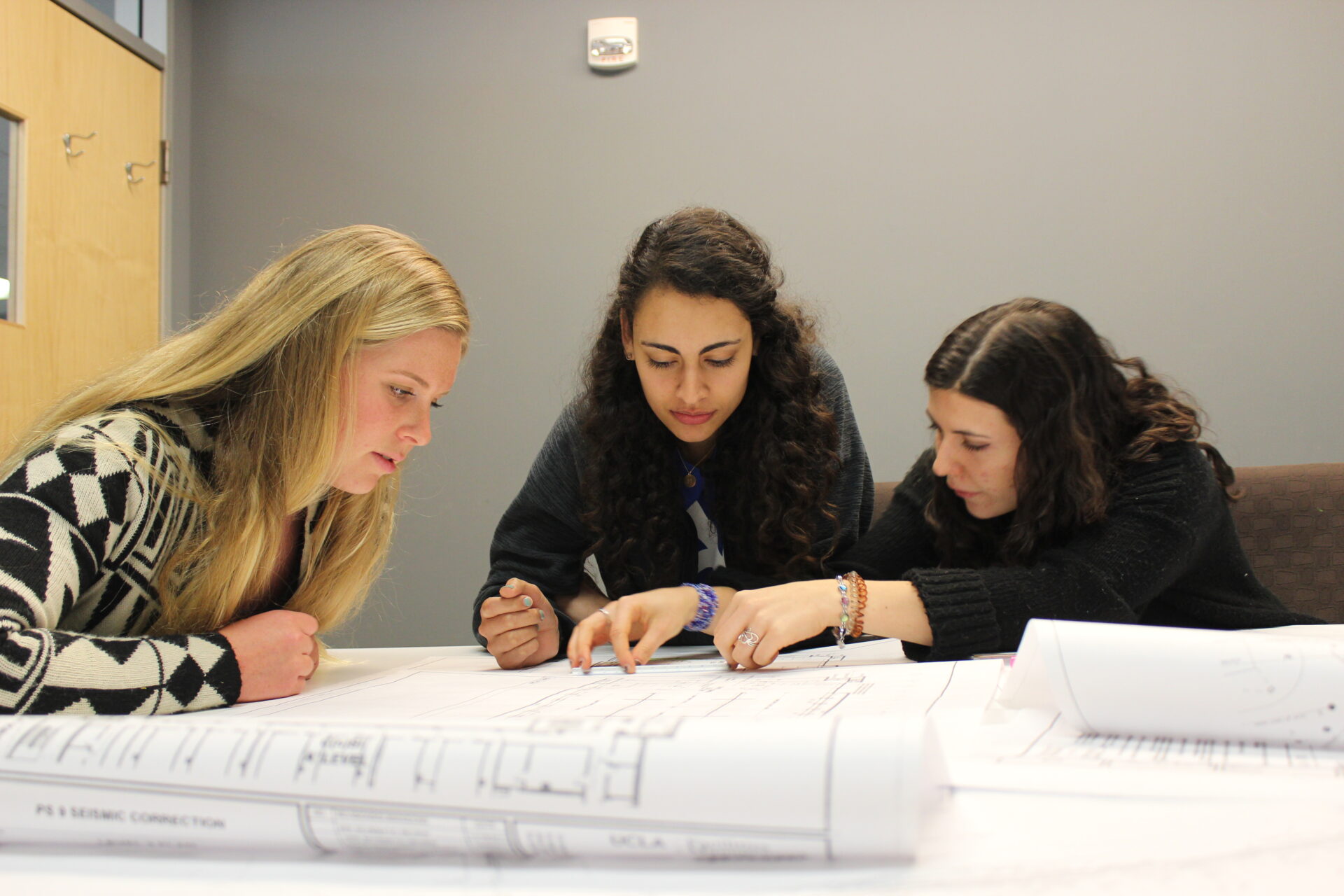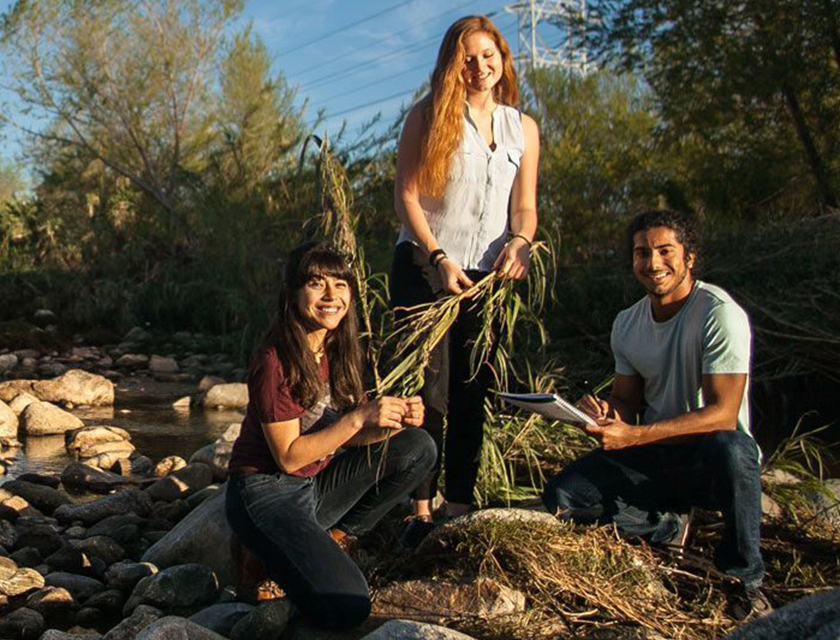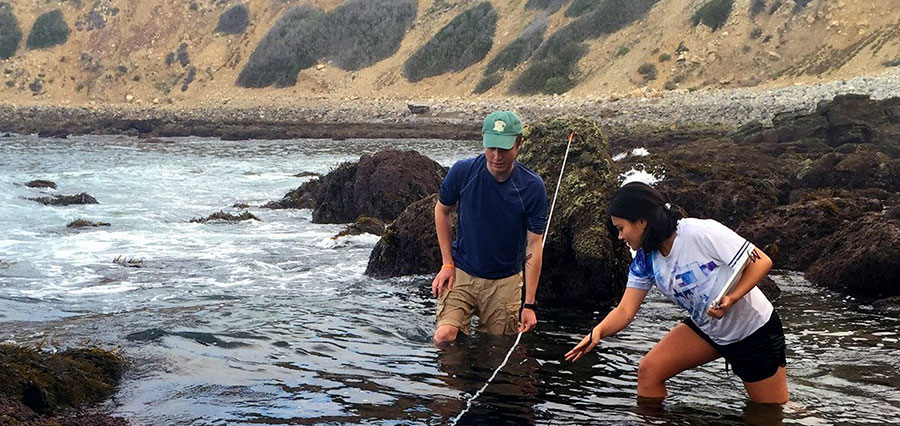UCLA is a vital source for education, research, and leadership in sustainability and the environment
More than 600 faculty and thousands of students from every corner of campus are actively engaged in environment and sustainability education and research. Below are some of the key research centers in sustainability and at this link you can find a current inventory of sustainability courses. Although each campus group works toward a unique mission, we collaborate across areas of expertise to accomplish shared goals. Together we lead by example, putting cutting-edge science into action and demonstrating solutions to complex environmental problems in Los Angeles and around the world.

Institute of the Environment and Sustainability
The Institute of the Environment and Sustainability (IoES) is a cross-campus research institute educating the next generation of environmental leaders and moving science into action. IoES undergraduate and graduate programs unite natural science, social science, law, public policy, and humanities to understand multidimensional challenges. Students and faculty collaborate on cutting-edge research, and IoES partnerships put expertise to work with businesses, nonprofits, agencies, and communities. The IoES also develops new narrative, media, and communication initiatives that amplify the institute’s impact and raise consciousness of environmental issues.
Sustainable LA Grand Challenge
The Sustainable LA Grand Challenge is an interdisciplinary university-wide initiative aimed at applying UCLA research, expertise and education to help transform Los Angeles into the world’s most sustainable megacity by 2050 — making it the most livable, equitable, resilient, clean and healthy megacity, and an example for the world.
Our sustainable approach to decision-making and development in L.A. County seeks to optimize economic, social, and environmental wellbeing for present and future generations.
Research Centers and Labs
UCLA has over 30 different research centers and labs focused on the wide variety of topics encompassed under environmental and sustainability work. Each provides students and faculty an opportunity to explore ways to solve complex problems within a sustainability framework that aims to create socially equitable, economically viable, and environmentally conscious communities. The list of centers and labs is shown below.
American Indian Studies Center
The core objectives of the American Indian Studies Center (AISC) are to facilitate and disseminate research about indigenous peoples, strengthen graduate and undergraduate education, and carry out university and public service programs related to the Center’s mission.
California Center for Sustainable Communities
The California Center for Sustainable Communities exists to create actionable science that improves the sustainability of urban systems. It aims to provide intellectual and conceptual frameworks for new synthesis and thinking in sustainability research for all Californians. Achieving progress toward sustainability requires maintaining and improving both human and ecosystem well-being. Our challenge is to make cities centers of sustainability in the ways they develop and redevelop beyond the next century.
California Nano Systems Institute Sustainability
Nanotechnology is vital to the maintenance of a sustainable environment for future generations. Our diverse teams are meeting the grand challenges of today and anticipating problems before they arise. Aligned with the UCLA’s Sustainable LA Grand Challenge, CNSI members have taken lead positions in the development of more efficient, cost-effective nanomaterials and devices that generate, store, and conserve energy as well as strategies to remediate emissions from industrial processes and pollutants in the air, water and land.
Center for Clean Air
The Center for Clean Air investigates the source, the transport and transformation, and environmental and society impacts of local, urban, regional, and global air pollution. Members of the center investigate formation mechanisms and dynamics, human exposure and health effects, and address real-world policy driven questions of how to most effectively move toward clean air in our cities. We focus on Los Angeles, but strive to produce results that can be applied at locations around the world.
Center for Clean Technology
One of the greatest challenges facing our nation is to ensure a healthy and sustainable environment, while maintaining the competitiveness of our industry and our high standard of living. The goal of the CCT is to create a science, technology and human resource base for the rational design of clean, sustainable and economically competitive technologies.
Center for Community Engagement
The Center for Community Engagement promotes and supports community-engaged research, teaching and learning in partnership with communities and organizations throughout Los Angeles, regionally, nationally and globally. The Center facilitates faculty and student work that integrates sustained, reciprocal engagement with the public and helps transform UCLA’s mission to support the co-creation, co-dissemination, co-preservation and co-application of knowledge for the betterment of society.
Center for Corporate Environmental Performance
The Center for Corporate Environmental Performance coordinates research and teaching on the environmental impact of corporations and market responses to green strategies. The center partners with corporations to improve their environmental performance while remaining competitive. Host Unit: Institute of the Environment
Center for Climate Science
The Center for Climate Science conducts research that helps communities better understand how climate change will affect them and how to respond. We work with communities to produce information they can put into action, and we engage the public so they are empowered to advocate for their futures. In the process, we build interdisciplinary research teams that bring to the table expertise in climate science, ecology, policy, and other vital fields. We also train the next generation of scientists to think outside the traditional boxes of academia and solve problems in the real world. Host Unit: Institute of the Environment
Center for Diverse Leadership in Science
Climate disruption, water scarcity, depleted soils, undrinkable water, species extinctions, and the loss of nature take something away from every human on the planet. Inclusive science can help solve these problems. But today’s scientific leadership is ethnically and culturally homogenous. We need to grow and nurture diverse leaders who will solve environmental problems and create pathways to sustainability. How do we create diverse leadership? Transformation occurs when we start on college campuses, with hands reaching out to communities, K through 12 schools, families, and retired individuals seeking ways to contribute to society. This is the work of the CDLS.
Center for Earth Systems Research (CESR)
CESR conducts research in the physics and biogeochemistry of the Earth’s atmosphere, cryosphere, and oceans. In addition, CESR is a base for a broad, cooperative effort to develop, test, and apply comprehensive numerical modeling capabilities for the Earth’s climate‐for periods extending over previous millennia, the present, and the coming centuries of anthropogenically induced changes. Host Unit: Department of Atmospheric and Oceanic Sciences
Center for Environmental Research and Community Engagement
The Center for Environmental Research and Community Engagement is focused on interdisciplinary projects spanning environmental science and engineering, chemistry, policy, regulation, public health, risk assessment, and communication. It provides underserved communities with testing of air, soils, or water at no or greatly reduced cost and assists communities with interpretation of data on contaminant levels.
Center for Environmental Statistics
The Center for Environmental Statistics (CES) analyzes and models data sets describing traffic counts, trip generation, urban economics, water supply, water quality, weather, seismicity, wild fires, and air quality of locations mostly in Southern California. In addition, we work with researchers from the Jet Propulsion Laboratory on analyzing remote sensing data collected from space.
Center for Healthy Climate Solutions
The Center for Healthy Climate Solutions helps communities adapt and respond to the adverse health effects of climate change. They turn public health research into actionable policies and practices. While their work extends globally, many of their projects begin in California. They work closely with communities to help people live healthier lives in the midst of the accelerating climate crisis. Their goal is to equip decision makers with site-specific solutions that tangibly benefit their community’s health, economy, and environment while reducing existing inequalities. With scientific research and community partners, they are strengthening health and resilience for all people, now and for generations to come.
Center for Impact@Anderson
The Center for Impact conducts research on corporate sustainability disclosures, working toward enhancing transparency in sustainability reporting. The center aims to: (1) integrate social impact into business education, (2) engage with UCLA faculty to formalize impact measurement and nudge corporate sustainability, and (3) help firms, consumers, investors and stakeholders make decisions that are better for people and the planet. The center focuses on cultivating an “impact mindset” among its constituents. An impact mindset in business considers not just shareholder value, but rather prioritizes maximizing stakeholder value, focused on protecting the triple bottom line of people, planet and profits.
Center for Occupational and Environmental Health
COEH is one of three centers created in 1978 by legislation that mandated that the State of California establish education, research and service programs in occupational health. In 1990, COEH expanded its scope to address environmental health. Housed within UCLA’s Fielding School of Public Health, the School of Nursing and the David Geffen School of Medicine, the center’s education and research serve government, industry, schools, health professionals and the general public. Areas of expertise include health risks in the workplace, pesticides and other toxic chemicals, the impact of built environments, air pollution, and more. COEH also facilitates seminars, symposia, and training.
Center for the Study of Women
The UCLA Center for the Study of Women works towards a world in which education and scholarship are tools for social justice feminism, improving the lives of people of all genders. It is an internationally recognized center for research on gender, sexuality, and women’s issues and the first organized research unit of its kind in the University of California system. Though CSW is funded by the Division of Social Sciences, it serves the entire university.
Center for Tropical Research (CTR)
The unifying goal of the senior scientists, postdoctoral researchers, and graduate students at the CTR is to understand the biotic processes that underlie and maintain the diversity of life in the tropics and to advance conservation efforts that protect endangered species and habitats. Core research investigates the impacts of human activities, including climate change, on biodiversity and conservation efforts. Host Unit: Institute of the Environment
CityLAB
CityLAB explores the challenges facing the 21st century metropolis through research and design, expanding the possibilities for cities to grow more livably, sustainably, and beautifully.
Counterforce Lab
The Counterforce Lab is an initiative by Professor Rebeca Méndez in the department of Design Media Arts at UCLA, that uses art and design to develop new collaborative insights, disciplines and methods to research, create, and execute projects around the ecological impacts of anthropogenic climate change.
Emmett Institute on Climate Change and Environment
The Emmett Institute is the nation’s leading law school center focused on climate change and the environment. Students and faculty work on energy, water and land-use law and policy at the local, national and international levels. And through the Frank G. Wells Environmental Law Clinic, students help to represent nonprofits and other public interest clients in litigation and regulatory matters.
Energy Design Tools – Home Energy Efficient Design (HEED)
Researchers in the Department of Architecture and Urban Design have developed a suite of free easy-to-use energy design software programs including HEED which shows home owners, builders, and architects how much energy and money they can save by making various design or remodeling changes. Users can easily draw in the floorplan of their house and can select from lists of standard wall and roof construction and different types of windows. The latest version adds new features including allowing changes to electric and gas utility rates plus rates for oil and propane, offering various kinds of operable window shading, allowing thermal mass to be added or removed, and the home’s calculates carbon footprint. Climate data is available for over one thousand locations around the world. This climate data can be graphically analyzed using another tool called Climate Consultant. Host Unit: Department of Architecture and Urban Design
Frank G. Wells Environmental Law Clinic
The Frank G. Wells Environmental Law Clinic trains law students in environmental lawyering. Under the supervision of faculty who are experienced environmental lawyers, students work on behalf of environmental and community groups on litigation and regulatory matters. Working closely with nonprofit and government agency partners and clients, the clinic takes on the most important environmental issues in southern California and beyond. The Wells Clinic offers excellent opportunities for students to obtain hands-on experience practicing environmental law. Students who take this six-unit course work on large and small cases, involving both federal and state law. The clinic teaches conceptual frameworks that support particular lawyering skills, while at the same time exposing students to real-world environmental law practice through intensive work on particular environmental issues.
Hydrogen Engineering Research Consortium (HERC)
UCLA’s Hydrogen Engineering Research Consortium (HERC) aims at research/development and education/public outreach efforts that will help accelerate the realization of the Hydrogen Economy.
Institute for Carbon Management
The Institute for Carbon Management draws on UCLA’s world-class resources: Engineers, scientists, policy experts and financial strategists are joining forces to find solutions to the pressing problem of carbon dioxide emissions. This is at the core of our mission: As one of the world’s greatest public research universities, UCLA’s primary purpose is the creation, dissemination, preservation and application of knowledge for the betterment of our global society.
Institute of Transportation Studies
Each year dozens of ITS faculty, students, and research staff collaborate on a wide array of transportation policy and planning studies, ranging from an analysis of the travel trends and transportation needs of immigrants and low-income workers, to the testing and evaluation of innovative fare programs to increase public transit use. Host Unit: School of Public Affairs
Joint Institute for Regional Earth System Science and Engineering (JIFRESSE)
Joint Institute for Regional Earth System Science and Engineering (JIFRESSE) is a scientific collaboration between UCLA and NASA’s Jet Propulsion Laboratory (JPL) to improve understanding of global climate change and to develop future projections about its effect on regional climates and environments. The Institute serves as a center for multi‐disciplinary research focused on the Southern California region including studies of the atmosphere; coastal ocean and land surface; and the physical, chemical and biological interactions among them.
Laboratory for Environmental Narrative Strategies (LENS)
The Laboratory for Environmental Narrative Strategies (LENS) is an incubator for new research and collaboration on storytelling, communications, and media in the service of environmental conservation and equity. We are a diverse network of faculty and students from across disciplines who explore how today’s environmental challenges connect to longer histories of imagining the natural world. At LENS, we begin with the idea that these challenges are as much cultural and political as they are scientific and technological.
La Kretz Center for California Conservation Science
The UCLA La Kretz Center for California Conservation Science works to conserve California’s biodiversity and ecosystems through research, education and public programs.They work with a broad set of partners to fund scientific research and educational activities that inform and enable conservation management through university-agency cooperation to meet the conservation challenges facing 21st century California.
Lewis Center for Regional Policy Studies
The Lewis Center, at the Luskin School of Public Affairs, promotes the study, understanding and solution of regional policy issues, with special reference to Southern California, including problems of the environment, urban design, housing, community and neighborhood dynamics, transportation and economic development.
Los Angeles Regional Collaborative for Climate Action and Sustainability (LARC)
The Los Angeles Regional Collaborative for Climate Action and Sustainability (LARC), is one of eight collaborative networks in California that strive to build regional resilience to climate impacts. As a convener and a connector, we facilitate the exchange of best practices and cutting edge research between climate practitioners from city and county government, regional agencies, non-profits, businesses, and academia. Housed at the Institute of the Environment and Sustainability (IoES), LARC brings together scholars, students, and climate planners from across UCLA and the County.
Luskin Center for Innovation
The Luskin Center for Innovation is an interdisciplinary research center focused on environmental sustainability, with initiatives including advanced transportation, clean energy, climate action, and sustainable water. The center conducts world-class research to inform real-world policy and partners with civic leaders in federal, state and local agencies as well as with nonprofit organizations and business associations. Based in the Luskin School of Public Affairs, the center teams with scholars and students from across UCLA and the broader UC system.
Marine Center
At the IoES Marine Center, we study the sensitivity of marine environments to anthropogenic impacts. With 44% of the world’s population living within 100 miles of the coastline, coastal systems are particularly vulnerable to human-made stressors such as pollution, eutrophication, and sea level rise. A majority of our research therefore focuses on these particularly sensitive coastal areas. But human impact on the ocean does not stop at the coast. The effect of Climate Change is detectable in all ocean systems including phenomena like temperature rise and pH decline. The IoES Marine Center has therefore dedicated its research to understand the breadth of human impacts on the oceans both locally and worldwide.
Resnick Program for Food Law and Policy
The Resnick Program for Food Law and Policy is a think tank at UCLA that seeks legal and policy solutions in support of a food system that yields improved health and sustainability outcomes for all.
Risk Institute (B. John Garrick Institute for the Risk Sciences)
The Garrick Institute for the Risk Sciences is structured to be the umbrella organization of research centers in the University of California, Los Angeles to address domain-specific research and development needs. The risk sciences are an integration of several disciplines rooted in logic and plausible reasoning that have emerged for the purpose of quantifying and managing the risk of complex natural and engineered systems and processes.
Stunt Ranch Reserve
The Stunt Ranch Reserve is a preserved natural chaparral habitat (naturally burned in 1995) used for research and education. While researchers track the re‐growth of vegetation on the charred slopes, facilities reconstruction and University‐community outreach are top priorities of the reserve’s project and faculty managers. Part of the UC Natural Reserve System and administered by UCLA.
Smart Grid Energy Research Center
The UCLA Smart Grid Energy Research Center (or SMERC) performs research, creates innovations, and, demonstrates advanced wireless/communications, Internet and sense-and-control technologies to enable the development of the next generation of the electric utility grid – The Smart Grid. SMERC also provides thought leadership via partnerships between utilities, government, policy makers, technology providers, electric vehicle and electric appliance manufacturers, Department of Energy research labs and universities, so as to collectively work on envisioning, planning, and executing the smart grid of the future.
University of California Center for Environmental Implications of Nanotechnology
UCLA and 12 collaborating institutions have recently been awarded $24 million in federal funding to establish the UC CEIN, which will help researchers design safer and more environmentally benign nanomaterials. This center will be housed at the UCLA California NanoSystems Institute and will explore the impact of nanomaterials on life forms and the interactions of these materials with various biological systems and ecosystems.
Water Resources Group
The UCLA Water Resources Group, hosted at the IoES, is composed of faculty and researchers across campus who have expertise in water resources, here in California, the nation and around the world. The Water Resources Group creates a “portal” for the public to identify experts across the campus, helps faculty and researchers work together, and create partnerships with governments, companies and nonprofits to address the big water challenges the world faces. Host unit: Institute of the Environment and Sustainability


